- Home
- Vicki Delany
Murder in a Teacup Page 2
Murder in a Teacup Read online
Page 2
“It’s my pleasure.” I turned to the woman seated across from Rose. “Hi. I’m Lily.”
She got to her feet. “Heather French. Pleased to meet you at last. Rose can’t stop talking about you.” She stretched out her hand, and I leaned across the table to shake it. Heather was about Bernie’s and my age, early thirties, but unlike us, the word that instantly came to mind was money. Her blond hair was slightly darker than mine and expertly streaked and highlighted; her nails were long and red, her hands sleek, her makeup subdued but perfect. She wore a white silk top cropped a couple of inches above a taut belly button pierced by a single jewel, a gold lamé jacket in a vaguely military style, and short (very short) white shorts. Her bare tanned legs ended in high-heeled gold sandals.
“Please have a seat,” she said, as though she were the hostess and this wasn’t my place.
I sat.
I glanced across the table at Bernie. She avoided my eyes.
Cheryl placed a cup of tea, already prepared the way I like it with a splash of milk and a few grains of sugar, and a plate of sandwiches in front of me. “Can I get you anything else, Rose?”
“More tea, Heather? Bernadette?”
They both said, “No, thank you.”
Heather lifted her arms and held them out to her sides. “You own this marvelous place, Lily. Aren’t you the lucky one? It’s absolutely adorable. Almost as adorable as Rose’s house.”
“Luck,” Bernie said, “has nothing to do with it. Lily works incredibly hard.” Something, I thought, was wrong with my friend’s voice. It had an edge to it I’d last heard when she first met Rose’s next-door neighbor, Matt Goodwill, and had taken an instant dislike to him.
“To live so close to the sea.” Heather’s voice was high-pitched, and she spoke almost in a singsong. “I can barely see the river from my penthouse in Manhattan. If I stand on the veranda with a pair of good binoculars on a clear day, I can get a glimpse.” Her laugh was as light and carefree as the tinkle of the teacups hanging from the old oak tree.
“That is so unfortunate,” Bernie said with a sad shake of her head. “I chose my house specifically for the view of the ocean from my office. It’s important, I felt, to have the water close to me, as the sea plays such an important role in my book.” I threw Bernie a look. She never engaged in games of one-upmanship. She might be able to see the bay from her house on an exceptionally clear day with a good pair of binoculars, but she’d been able to afford the place only because it was in such bad repair. The homeowners hadn’t been able to find anyone who wanted it for a vacation rental. The last time it rained, she’d called Rose and asked if the B & B had any spare buckets lying around that she could borrow.
Heather giggled. “A top-ranked chef and a soon-to-be bestselling author. You’re lucky to be surrounded by such talented women, Rose.”
“I think so,” Rose said.
My days begin before six when I start breakfast in the B & B and end long after the tearoom closes when I finish prep for the next day. Meaning twelve to fourteen hours on my feet, seven days a week. It felt so good just to be sitting down. I took the first welcome sip of the Creamy Earl Grey, rich and heady with vanilla and bergamot and just a touch of dulce de leche for that hint of sweetness I need at the end of a long day. “Rose tells me your family’s joining you tomorrow.”
Heather threw up her hands. The diamonds in the ring on her left hand flashed in the sun. “It’s going to be so great! I can’t wait. My gran’s coming, as well as my mom and dad. You’re so lucky to be able to live close to your grandmother, Lily. I adore my gran to bits, but I don’t see her nearly as much as I’d like. Iowa is so far away.”
“I’ve heard of these things called airplanes,” Bernie said.
Heather slapped my friend’s hand. “You are so funny. Isn’t she a hoot, Rose?”
“Not exactly the word I’d use,” my grandmother said.
“My brother and his wife are coming on our little vacation, too, and the less said about her, the better. I’m not so excited about seeing them, but we’ll manage. And the kids, of course. Tyler and Amanda, my nephew and niece. It’s been ages, and I’m really looking forward to spending some time with them. I want to take them to the beach, and we’re going on a whale-watching tour. I’ve chartered us a boat for later in the week. It’s going to be so much fun.” Heather beamed.
I felt myself smiling. I liked her. Her excitement was genuine and her enthusiasm infectious. Bernie clearly didn’t agree. Her face was pinched with disapproval and her eyes narrow. Not exactly the picture of a hoot.
Cheryl appeared at my side. “I’m sorry to interrupt, Lily, but Nancy’s on the phone. There’s some problem with the strawberries.”
“Oh, goodness,” Heather laughed. “That sounds dreadfully serious. ‘Some problem with the strawberries.’ How dramatic!”
I didn’t laugh. In my restaurant, strawberry problems are not a laughing matter. “Not again. I’ll be right there.” I got to my feet. “Sorry, gotta run. Nice meeting you, Heather.”
She jumped up. “And it was so nice meeting you, Lily. I’ll bring my family around for tea and you’ll have to join us. I won’t take no for an answer.” She stamped her foot and crinkled her nose.
“I’d like that,” I said.
“If you’ll excuse me,” Bernie said. “I have to be going, too. Thanks for the tea, Rose.”
“So nice to meet you,” Heather trilled. “Let me know when you’re launching your book and I’ll come!”
Bernie followed me into the kitchen. I picked up the phone. Cheryl’s cousin Nancy owns a berry farm, and in my opinion, she runs her farm very badly. She’d failed to deliver my order once before, and today I simply told her that if the baskets of freshly picked strawberries weren’t here tomorrow morning, I’d find a new supplier. It’s important to me to use local ingredients from local farmers, whenever possible. But I have to have strawberries at this time of year.
“Isn’t she a horror!” Bernie said, once I was off the phone, the Great Strawberry Crisis averted. For now.
“Nancy? I wouldn’t go quite that far, although she needs to be a lot more reliable if she wants to stay in business.”
“Not her. Heather.”
“Heather? I thought she was sweet.”
“Ha! All she talked about was herself and how much money she has.”
“She actually said that?”
“Well, no. Not in so many words. But the penthouse apartment in Manhattan, the private boat she’s chartered. And that gold jacket. Talk about tasteless. What do you think? Two thousand bucks?”
“I have no idea. Rose seemed to like her.” No one could express disapproval better than my grandmother. I went into the pantry for my apron and hairnet and called over my shoulder, “You don’t have to like her, Bernie. Besides, you’re the world’s worst judge of character.”
“I’m nothing of the sort.”
“Sure you are. Look at how much you distrusted Matt Goodwill when you met him. You practically accused him of murder. Come to think of it, you did accuse him of murder.”
“That was different.”
“It’s always different,” I said.
Cheryl ran into the kitchen. “A van’s just driven up. Eight people wanting the full tea. No reservation.”
I let out a long breath. It was almost closing time, but eight people were eight customers. “Do we have room?”
“I can seat them in the garden. People are starting to leave.”
I did a quick mental inventory of the fridge and the pantry. “Then I can feed them. I’ll have to use some of what I made for tomorrow.” I reached for the fridge door. “Uh, Bernie, can you get out of the way, please.”
“And that ring. Did you see that ring? Silly question, you could see that ring in outer space.”
“Good-bye, Bernie,” I said, giving her an affectionate push in the direction of the back door.
* * *
I didn’t see Rose or her guests that evening.
I worked in the tearoom for a few hours after closing, poaching chicken and boiling eggs for tomorrow’s sandwiches, making scones, cupcakes, tarts, and macarons to replenish the ones I’d served to our last-minute arrivals. Despite the long hours, I always enjoy time alone in the kitchen after everyone has left. I can move at my own pace, nibble on raw cookie dough, or snatch a scone off a tray straight out of the oven, make the things I enjoy making, even though I’ve made them hundreds, maybe thousands, of times before. I play music from my iPad through Bose speakers and dance or sing as I work. As I inherited not one whit of musical talent from my mother, I never so much as hum if anyone’s around.
By eight o’clock, the larder was once again satisfyingly full, and it was time to turn off the ovens, switch off the lights, and go home to my dog.
I might work long, hard hours at my tearoom, but my commute can’t be beat. I walked down the long curving driveway toward the huge old house that is Victoria-on-Sea, my grandmother’s B & B. The house had been built in 1865 as a vacation home for a Boston banker and his family. The house boasted eight guest bedrooms and suites on two floors, Rose’s private apartment on the ground floor, a formal dining room, and a drawing room that was now used as a common room for visitors. The outside of the house is painted white, with a gray roof, turrets and dormer windows sticking out all over, miles of gingerbread trim, and a wide veranda running the length of the building. The veranda, full of generously-filled flowerpots, faces east across the gardens and down the long driveway to the highway. The rear of the house faces the water, and guests are welcome to sit on the benches provided and look over the bluffs to the open waters of Cape Cod Bay. A three-car garage, painted to match the house, stands alone at the edge of the guest car park. The garage was originally the carriage house, modernized by the previous owners. We don’t need space for three vehicles. Between Rose and me, we have one car. Hers. Before coming here, I’d lived my entire life in Manhattan. I can drive, if I have to, but I’ve never owned a car. My cousins in Iowa find that as shocking as if I’d never learned to read.
I cut across the lawn, skirted the rose garden, and slipped around the house to let myself into the small cottage overlooking the bluffs and the bay beyond.
Éclair, my Labradoodle, so named because of the streak of mocha running in a band down her stomach between her mostly cream-colored fur, ran to greet me, and I greeted her with a belly rub. I felt better knowing she hadn’t been alone all day—I’d arranged for one of the B & B housekeepers to come over in the early afternoon to check her water dish and take her for a short walk.
Greetings completed, I let Éclair into the enclosed side yard while I changed out of my cook’s clothes of jeans and T-shirt into shorts and another comfortable T-shirt. Then I took the leash off the hook by the door and went outside. Éclair’s good enough to stay close and come when I call, so I didn’t attach the leash to her collar, but I always keep it with me. Not everyone likes dogs, no matter how small or how friendly they might be, and B & B guests can usually be found enjoying the gardens or the view in the evening. Tonight, lights shone from every upstairs room, although the parking lot wasn’t full. It was still reasonably early, and most guests would have gone out for dinner. Éclair and I strolled along the path at the top of the bluffs. A few people sat on benches, looking over the bay and the lowering sun. They greeted me politely and a couple of women fussed over the dog. Éclair is always happy to be fussed over.
We enjoyed a good long walk, and I felt some of the tension of the day draining away. Back home, I fed Éclair, made myself a sandwich with some of the poached chicken I’d pinched from the tearoom, and went to bed with my book.
The exciting life of a restaurant chef in high season.
I didn’t mind. This summer was all about establishing the tearoom and saving Rose’s B & B from bankruptcy. A social life would have to wait.
I was asleep before it was fully dark outside, lulled by the sound of the surf crashing on the rocks below and the gentle breathing of Éclair at my side.
Chapter 3
I was up at quarter to six, as usual. I let Éclair into the yard while I had my shower, and then I gave her breakfast and dressed as she ate. At six o’clock, we walked the short distance to the rear entrance of the B & B, and I let myself into its dark, tiny, out-of-date kitchen.
The first thing I always do is put on the coffee. The initial pot isn’t for the guests, but for me. That task done, I took a banana out of the big bowl on the counter and peeled it to munch on while I got the baking started. Éclair sniffed in all the corners, in case someone had been in since the last time she was here and had dropped a slice of sausage or a T-bone steak on the floor. She never finds anything, because the kitchen is normally only used to prepare breakfast, but she never gives up hope. She then settled under the Formica table to watch me work. And no doubt, to hope I’d drop something. That never happens, either.
At Victoria-on-Sea, we offer our guests a traditional full English breakfast every day, although updated to suit modern tastes and diets, along with cereal and yogurt, pastries and fruit, and a low-calorie option. In the evening, Rose leaves a note on the table telling me how many breakfasts to prepare and if there are any dietary requirements.
We had a full house today: eight rooms and suites containing sixteen adults and six children. Fortunately, no one had any special demands. Rose’s note said one reservation hadn’t arrived, but the guest had phoned to say their flight had been canceled and they might not get in until this morning.
I made a mental note to ensure I had extra muffins ready in case the latecomers arrived after breakfast service ended at nine. If they’d been scrambling for flights and traveling all night, they would not arrive in a good mood.
I had pork-and-sage and lower-fat turkey sausages, bought from a local butcher, frying on the stove, and bran muffins in the oven, when Edna, the breakfast assistant, arrived.
“Morning, Lily.” She took her apron off the hook by the door and bent over to give Éclair a pat of greeting. “Did Rose’s special guests get in?”
“I assume so, as I didn’t hear otherwise.”
“She’s so excited about having her friends here. It’s quite sweet.” Edna wasn’t much younger than my grandmother, and she didn’t need this job, or any other. At bridge one day, Rose had overheard Edna saying she was getting bored in her retirement, and before Edna knew what was happening, she’d been hired. She put a bag on the table. Inside, glass jars tinkled. Edna made much of the jam and preserves we used in the B & B and sold in the tearoom.
I opened the bag and lifted out a jar. “Marmalade? You don’t usually make marmalade.”
“Oranges were on sale in the supermarket last week. Can you use them?”
“Jam’s usually more popular with scones, but I have an idea. Thanks. Can I have a taste?”
“Feel free,” she said. “They’re yours now.”
I twisted the top off one of the jars. The preserves were a brilliant orange, thick with chunks of sliced fruit and glistening jelly. I scooped up a bit with a spoon and touched the spoon to my tongue. The orange flavor was strong and tart, with exactly the right touch of sweetness. “Like eating sunshine,” I said, licking the spoon.
Edna smiled and I turned back to the breakfasts.
A streak of black fur shot across the kitchen and landed on the counter next to the stove. I was so startled, I almost dropped the bowl of eggs I was beating for an egg-white frittata. Éclair leapt to her feet and let out a single sharp bark.
“Shush!” I said. “It’s only Robbie.” I glared at the cat. “You scared me half to death.”
He gave me a look I interpreted to be a grin and then turned his attention to the sausages on the stove. I picked him up and put him on the floor, knowing that was a waste of time. He’d be back when it suited him.
Robbie coming into the kitchen wasn’t unusual, but he didn’t normally appear this early. That could only mean . . .
Tap tap tap came the soun
d of Rose’s cane in the hallway.
“Good morning.” My grandmother settled herself at the table and her cat leapt into her lap.
“You’re up early,” I said.
“Exciting day. I won’t have my tea in here this morning, Edna, because I’m joining my friends for breakfast.”
“That’s good,” said Edna, “ ’cause I don’t serve tea in here.” She lifted a tray loaded with jugs of milk, cream, and juices and took it into the dining room.
Rose was a woman who liked color. Today, she wore an ankle-length purple dress splashed with enormous orange flowers. The dress was sleeveless, so she’d pulled it on over a bright yellow T-shirt. Long earrings made of feathers dyed purple caressed her shoulders, and she’d gone to a lot of trouble this morning with her makeup. Black liner outlined her cornflower-blue eyes, thick layers of mascara caked her lashes, rouge brought color to her cheeks, and her mouth was a slash of crimson lipstick.
Rose had lived in Iowa most of her life and I’d grown up in Manhattan, but my grandmother and I have always been close. I sometimes wonder how much of that has to do with the fact that we look so much alike. If you didn’t know better, you’d think it was me smiling proudly from the silver-framed wedding picture on her nightstand. These days, her once-blond hair is a solid gray and cut into short spikes, and her fine porcelain skin is lined and folded and scattered with dark spots, but her light blue eyes still shine with intelligence and wit, and I can only hope I’ll be as sharp as Rose when I reach her age. In one thing only, our appearance differs. Rose barely reaches five feet tall and is as fine-boned as a bird, whereas I get my additional eight inches of height from my father.
“Your friend arrived safely?” I asked.
“It was lovely to see Sandra again. She was tired after the trip, so we didn’t get much of a chance to get caught up. I’m looking forward to doing that at breakfast.”
“And the rest of the family?” I opened the oven door and checked the muffins by pressing on one of them with my finger. It felt firm, so I took the tray out of the oven.

 Silent Night, Deadly Night
Silent Night, Deadly Night Coral Reef Views
Coral Reef Views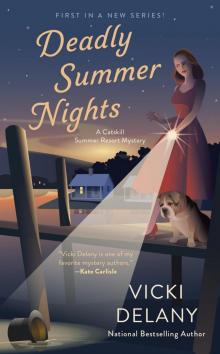 Deadly Summer Nights
Deadly Summer Nights Murder in a Teacup
Murder in a Teacup Whiteout
Whiteout Dying in a Winter Wonderland
Dying in a Winter Wonderland Tea & Treachery
Tea & Treachery Rest Ye Murdered Gentlemen
Rest Ye Murdered Gentlemen Body on Baker Street: A Sherlock Holmes Bookshop Mystery
Body on Baker Street: A Sherlock Holmes Bookshop Mystery Body on Baker Street
Body on Baker Street Gold Mountain
Gold Mountain Blue Water Hues
Blue Water Hues Hark the Herald Angels Slay
Hark the Herald Angels Slay Murder at Lost Dog Lake
Murder at Lost Dog Lake Blood and Belonging
Blood and Belonging A Winter Kill
A Winter Kill White Sand Blues
White Sand Blues Scare the Light Away
Scare the Light Away Burden of Memory
Burden of Memory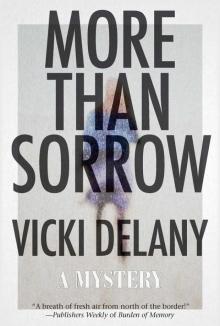 More Than Sorrow
More Than Sorrow In the Shadow of the Glacier
In the Shadow of the Glacier Gold Digger: A Klondike Mystery
Gold Digger: A Klondike Mystery Gold Web
Gold Web Haitian Graves
Haitian Graves Valley of the Lost
Valley of the Lost We Wish You a Murderous Christmas
We Wish You a Murderous Christmas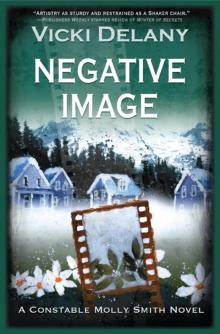 Negative Image
Negative Image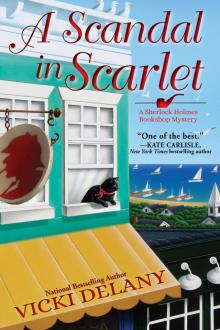 A Scandal in Scarlet
A Scandal in Scarlet Juba Good
Juba Good Winter of Secrets
Winter of Secrets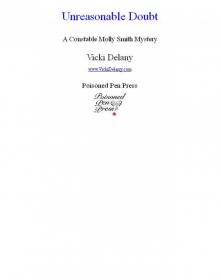 Unreasonable Doubt
Unreasonable Doubt Gold Fever
Gold Fever Among the Departed
Among the Departed Elementary, She Read: A Sherlock Holmes Bookshop Mystery
Elementary, She Read: A Sherlock Holmes Bookshop Mystery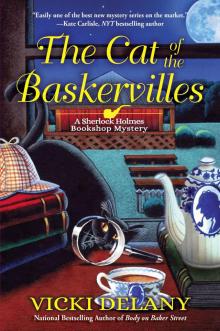 The Cat of the Baskervilles
The Cat of the Baskervilles